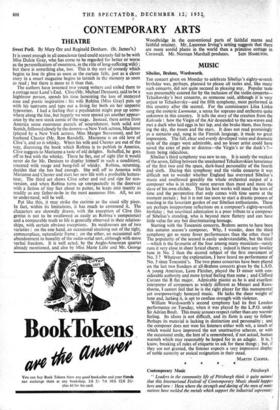CONTEMPORARY ARTS
THEATRE
Sweet Peril. By Mary Orr and Reginald Denham. (St. James's.) IT is sweet enough in all conscience (and could scarcely fail to be with Miss Dulcie Gray, who has come to be regarded for better or worse as the personification of sweetness, in the rale of long-suffering wife) • but there is something else, too. This is the sort of comedy which begins to lose its gloss as soon as the curtain falls, just as a clever story in a smart magazine begins to tarnish in the memory as soon as read ; but there is more to it than that. The authors have invented two young writers and exiled them to a cottage near Land's End. Clive (Mr, Michael Denison), said to be a highbrow person, spends his time lamenting the loss of moneyed ease and poetic inspiration : his wife Robina. (Miss Gray) puts up with his tantrums and taps out a living for both on her unpoetic typewriter. I had a feeling that a psychiatrist might pop up some- where along the line, but happily we were spaied yet another appear- ance by the new stock comic of the-stage.: Instead, there arrive from America some enormous parcels of nourishment, both solid and Scotch, followed closely by the donors—a New York actress, Marianne (played by a New York actress, Miss Margot Stevenson), and her husband Chester (Mr. Ron Randell). Marianne is an old love of Clive's, and so is whisky. When his wife and Chester are out of the way, discussing the book which Robina is to publish in America, Clive suggests to Marianne a taste of old delights. Rebuffed, he goes off to bed with the whisky. There he lies, out of sight (for it would never do for Mr. Denison to display hirhself in such a condition), smeared with rouge and bung-full of whisky. Robina, returning, decides that she has had enough. She will off to. America with Marianne and Chester and start her new life with a profitable lecture- tour. The third act shows Clive sober and sad and ripe for con- version, and when Robina turns up unexpectedly in the doorway with a fiction of tiny feet about to patter, he leaps into inanity as readily as any father-to-be in the most nauseous film. All, we are to understand, will be well. , Put like this, it may strike the curious as the usual silly piece. In fact, within its limitations, it has much to commend it. The characters are shrewdly drawn, with the exception of Clive (his genius is not to be swallowed as easily as Robina's competence) and a comparable truth to life is generally observed in their relation- ships, with certain obvious exceptions. Its weaknesses are of two varieties : on the one hand, an occasional straining out of the tight, commonplace, naturalistic frame ; on the other, an occasional self- abandonment to banality of the radio-serial sort, although with more verbal freedom. It is well acted, by the Anglo-American quartet already mentioned, and also by Miss Marie Lahr and Mr. George Woodbridge in the conventional parts of faithful mama and faithful retainer. Mri,Lamence Irving's setting suggests that there are more sordid places in the world than a primitive cottage in Cornwall. Mr. Norman Marshall produces. IAIN HAMILTON.


































 Previous page
Previous page